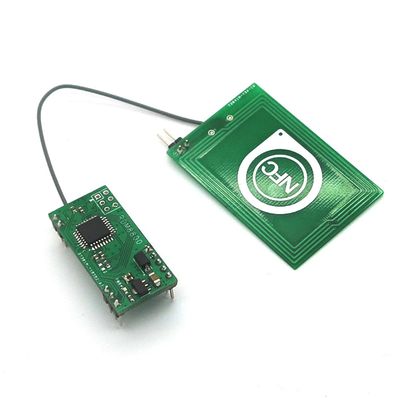Difference between revisions of "RDM8800"
(→Overview) |
|||
| Line 1: | Line 1: | ||
==Overview== | ==Overview== | ||
| + | [[File:RDM8800 NFCRFID MODULE.jpg|thumb|400px|right]] | ||
RDM8800 card reader is a module based on PN532 chip customized for 13.56MHz NFC RFID card, compatible with [[RDM6300]] interface, which can read data directly from the serial interface. | RDM8800 card reader is a module based on PN532 chip customized for 13.56MHz NFC RFID card, compatible with [[RDM6300]] interface, which can read data directly from the serial interface. | ||
| − | Unlike ordinary RFID modules, RDM8800 integrates LGT8FF8A chip, compatible with Arduino library, thus we can modify the firmware to suit our own needs. Itead Studio also released the source codes of RDM8800 firmware, and users can make secondary development based on it. | + | Unlike ordinary RFID modules, RDM8800 integrates LGT8FF8A chip, compatible with Arduino library, thus we can modify the firmware to suit our own needs. Itead Studio also released the source codes of RDM8800 firmware, and users can make secondary development based on it. |
==Specifications== | ==Specifications== | ||
Revision as of 02:32, 29 May 2014
Contents
Overview
RDM8800 card reader is a module based on PN532 chip customized for 13.56MHz NFC RFID card, compatible with RDM6300 interface, which can read data directly from the serial interface.
Unlike ordinary RFID modules, RDM8800 integrates LGT8FF8A chip, compatible with Arduino library, thus we can modify the firmware to suit our own needs. Itead Studio also released the source codes of RDM8800 firmware, and users can make secondary development based on it.
Specifications
[1]: Version 1.0 firmware does not support ISO 14443 Type B at present, which requires users to make secondary development.
Electrical characteristics
Hardware
pinmap
Data formats
According to V1.0 firmware, there is one type of data output:
- Directly output a card N.O.
When a resistor (default) is soldered onto silkscreen "1" position on the board, the serial port will output a 10-digit decimal ACSII code card N.O. directly. For example: the card number is 46553491, the output data will be "0046553491", (HEX: "0x30 0x30 0x34 0x36 0x35 0x35 0x33 0x34 0x39 0x31".
Interrupt pin
- LED
According to V1.0 firmware, once an ID N.O. is read, LED pin will output a 10ms high-level pulse.
 Notice
Notice